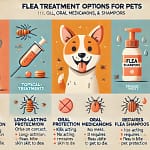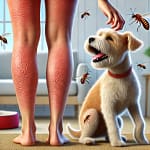Itching in dogs, also known as pruritus, is a common problem that can have various causes. It can be caused by a range of factors, including allergies, parasites, skin infections, dry skin, and underlying medical conditions. Here are some potential causes and steps you can take to help alleviate itching in dogs:
Allergies
Dogs can be allergic to certain foods, environmental factors (such as pollen or dust mites), or flea bites. If you suspect an allergy, consult your veterinarian for proper diagnosis and discuss potential treatment options, including dietary changes or allergy testing.
Parasites
Fleas, ticks, and mites can cause intense itching and discomfort in dogs. Regular use of flea and tick preventatives, as well as routine grooming and inspection, can help prevent infestations. If your dog has parasites, consult your veterinarian for appropriate treatment.
Bacterial or fungal infections
can lead to itching. Signs of infection may include redness, hair loss, odor, or discharge. Your veterinarian can diagnose and prescribe medications, such as antibiotics or antifungal treatments, to address the underlying infection.
Dry Skin
Dry skin can cause itchiness, especially during the colder months or in dry climates. Ensure your dog is properly hydrated, and consider adding omega-3 fatty acid supplements to their diet, as they can help improve skin health. Using a humidifier indoors can also help add moisture to the air.
Underlying Medical Conditions
Itching can be a symptom of underlying medical conditions such as hormonal imbalances (e.g., hypothyroidism or Cushing’s disease) or autoimmune disorders. If you suspect an underlying condition, consult your veterinarian for a thorough examination and appropriate testing.
Avoid Irritants
Identify and avoid potential irritants that may be causing your dog’s itching. This can include certain shampoos, detergents, or environmental factors such as certain plants or chemicals.
It’s important to consult with a veterinarian if your dog is experiencing persistent or severe itching. They can provide an accurate diagnosis and recommend appropriate treatment options based on your dog’s specific needs.
Itching in dogs can have different causes and mechanisms. The most common causes of itching are allergic, bacterial, parasitic, and fungal. Almost every skin infection can have itching as a symptom.
Parasitic infestation
should be identified and eliminated. Bacterial infection and fungal infection should be managed along with concurrent anti-itch medications. A thorough history should be taken. There are various topical and systemic medications available to control itching in dogs.
Topical Anti-itch medicines for dogs
Shampoos and conditioners are given to control itching in dogs. Their action may depend upon the removal of causative agents such as bacteria, local anesthetic effect cooling or moisturizing effect of the drug, Itching and scratching is a common issues among dogs. Here are a few of the more typical reasons for itching and scratching in dogs and how to best help treat and prevent it from occurring in the future.
Fleas, Ticks
Flea saliva is very allergenic, so a single flea can cause flea allergy dermatitis that makes your dog itchy at the bite site (often around the head, neck, tail base,..). Minimize your dog’s exposure by limiting his access to locations where a heavy burden of fleas may exist — wooded areas, dog parks, daycare, kennels, etc.
Discuss with your veterinarian if using a preventative for both ticks and fleas is ideal for your dog.
Mange
Mites like mange are microscopic insects that burrow deep into the layers of the skin to feed and live. Chewing their way through your dog’s skin creates inflammation and leads to secondary infections (bacteria, yeast, etc.). Skin-lesions from mange can manifest all over the body, but the armpits, groin, ear margins, and areas having minimal hair (elbows, etc.) are most commonly affected.
Seasonal Allergies
Seasonal allergies, which mainly manifest with itchy skin in dogs, tend to be most prevalent during spring, summer, and fall
Nutritional Allergies
While dogs most frequently suffer from allergies due to environmental triggers, allergic reactions to food is possible. Some dogs may be allergic to certain proteins or grains. This allergic reaction may exhibit in a number of ways, including skin inflammation and itching.
. As each pet’s needs differ, consult your veterinarian to determine which type of preventative is most appropriate
Dogs always itchy
It wasn’t long after I had left a comment on my share of this Question, I realized my dogs had a worm problem. I dewormed Jolly and Bubu only a few months ago. Normally, this annual deworming would be enough as we don’t expose the dogs to fields, parks, etc. A year ago, we moved to a place with a compound/garden and the dogs would dig holes, eat soil, and get exposed to microbes in the soil. After the maximum deworm dosage over 3 days, Jolly expelled Pin worms.
Now I know my dogs need deworming every 3 months due to more soil exposure. After 2 weeks of the deworming, today, I follow up with another dose to kill the new worms that hatch from the eggs the last dose could not kill. These anti worm meds don’t kill the eggs, only the worms. I wonder why the stomach acid that is said to be able to dissolve metal can’t destroy worms or eggs? Anyway, this (update) is to share my recent research yielded that worms in dogs can be the cause of itching, inflammation, scratching, skin infections, loss of appetite, and fatigue.
Apoquel can be effective in treating itchiness in dogs. It’s a medication specifically designed to target the immune system response that causes itching in allergic skin diseases.
Apoquel works by:
- Blocking specific immune system proteins: This helps reduce the inflammation and itching associated with allergies.
- Providing rapid itch relief: Many dogs experience significant relief from itching within hours of starting Apoquel.
However, it’s important to consult with a veterinarian before giving Apoquel to your dog. They can assess your dog’s condition, determine if Apoquel is appropriate, and provide proper dosage instructions.
Please note: Apoquel is not a cure for allergies, but it can help manage the symptoms and improve your dog’s quality of life.
Another drug Cyclosporin is also effective in dog itch
cyclosporine can be effective in treating itchiness in dogs. It’s a powerful immunosuppressive medication that helps reduce the body’s immune response, which can be beneficial for dogs with allergic skin conditions that cause itching.
However, it’s important to note that cyclosporine should only be administered under the guidance of a veterinarian. It can have side effects, and the dosage needs to be carefully monitored.
Some common conditions where cyclosporine might be considered include:
- Allergic skin dermatitis: This is a common condition caused by allergies to allergens like pollen, dust mites, or fleas.
- Atopic dermatitis: This is a hereditary skin condition that causes itching and inflammation.
- Food allergies: If a dog has a food allergy, cyclosporine may be used to manage the symptoms, while the underlying allergen is identified and avoided.

Dr. Suranjan Sarkar is a veterinarian and also a writer and editor for both print and digital with a love for travel, animal, and architecture. Much of his writing has focused on human and animal health and welfare. A life-long pet owner, His two favorite canine quotes are, “Be the kind of person your dog thinks you are,” and “Dogs communicate their feelings honestly and directly. There’s no hidden agenda or manipulation.”









